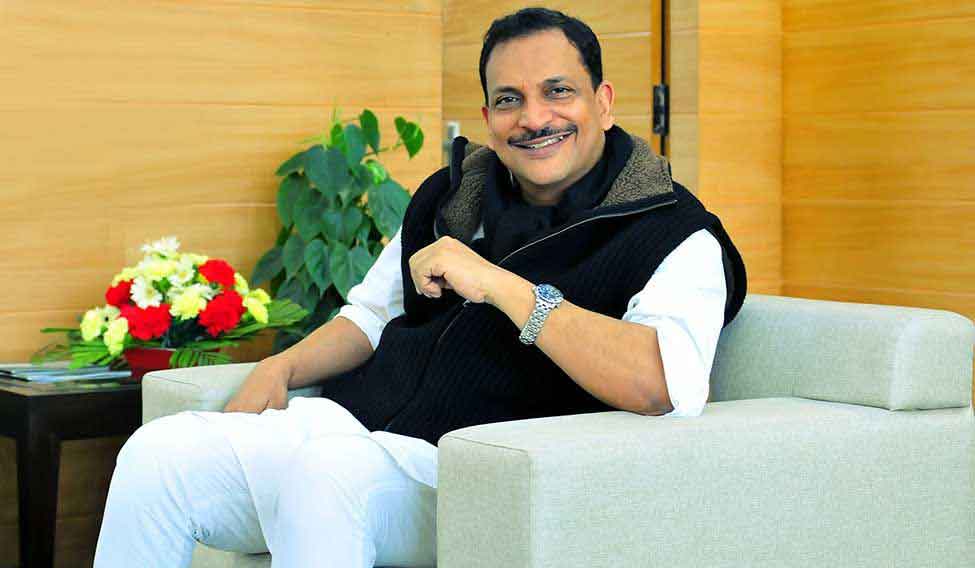WHEN HE WAS first elected to the Lok Sabha in 1996, Rajiv Pratap Rudy was seen as a 'giant killer', having won from Chapra—former Bihar chief minister Lalu Prasad's stronghold. In the 2014 general elections, he won the Saran seat, defeating Lalu's wife, Rabri Devi. Today, as Union minister of state with independent charge of skill development and parliamentary affairs, he spends most of his time in Delhi. But he is never too far from his home state. A licensed commercial pilot, Rudy will be in Bihar campaigning, ensuring the BJP passes the crucial test with flying colours. Excerpts from an interview:
The BJP and the JD(U) had fought the polls together all these years, under Nitish Kumar's leadership, and are fighting each other now. What has changed?
It was in 1994 that Nitish Kumar split with Lalu Prasad . From then on, he has always positioned himself against Lalu. His political leadership and growth were on account of that posturing. The common factor that the BJP and Nitish shared was that we were both opposed to Lalu and his politics. That brought us closer, and we became partners.
When Narendra Modi came to the centre stage of the BJP and the NDA, Nitish jumped the queue and wanted to claim the space of Muslim votes. After the national executive where they invited Modi to dinner and pulled out of it, the two of us fell out. He actually broke it off. He wanted to edge out Lalu and the BJP, and garner Muslim votes and emerge as the compromise candidate for the post of prime minister. All that visualisation did not work.
Both parties are staking claim over the development in the state. Which aspects would you claim?
Till recently, Nitish Kumar was seeking a special status and special package for Bihar. When Prime Minister Modi announced a package, he said it was repackaged. If the money was there already, why was the work not carried out? It is also funny that he then went on to announce a package of his own.
It looks like a personal battle between Modi and Nitish Kumar.
It is not personal at all. The day we decided to part ways, we had decided to fight the elections alone, with or without smaller partners like Upendra Kushwaha.
Today, things are very different for Nitish. He is a lot weaker, with most of his close people, from Jitan Ram Manjhi to Gyanendra Singh Gyanu to Shakuni Choudhary, leaving him. He is isolated.
Lalu's party used to contest all 243 seats. Now they will contest 100. His people are not willing to accept this, or Nitish's leadership. Last time, the BJP fought 100 seats and the JD(U) 137. We now have the advantage of a lot more seats; in fact, the largest number.
Nitish has many things stacked against him—anti-incumbency, arrogance. The BJP, on the other hand, has a Central government. Nitish has now got himself an image of someone who will oppose the Centre, like Delhi Chief Minister Arvind Kejriwal. It will be a discordant government like in Delhi, and the people of Bihar know better.
After the BJP's debacle in Delhi, is Bihar the testing ground for Modi's popularity?
It is not so. The first 25 years of the state saw the Congress play in the name of secularism, and there was absolutely no development. The next 15 years saw Lalu Prasad and the jungle raj. The next ten years were under the leadership of Nitish, [it was] no better—no new investments came, agriculture remained stagnant. The Congress divided society into Hindus and Muslims, Lalu into forwards and backwards, but Nitish divided society most of all, into pichda and atipichda, dalit and mahadalit, forward Muslims and backward Muslims. He has done it all.
In this scenario, the prime minister has established the development card, and has forced Nitish to talk development.

Identity proof
Bihar voters will find the photographs of their candidates, as well as the party symbols, on the electronic voting machines. This is the Election Commission's way of dealing with the namesake phenomenon that had become a big challenge in the recent elections. Take, for instance, the 2014 Lok Sabha elections. In the Mahasamund constituency in Chhattisgarh, there were eleven candidates named Chandu Lal Sahu, including the BJP's. The BJP then approached the Election Commission saying the Congress was behind the dirty trick.






